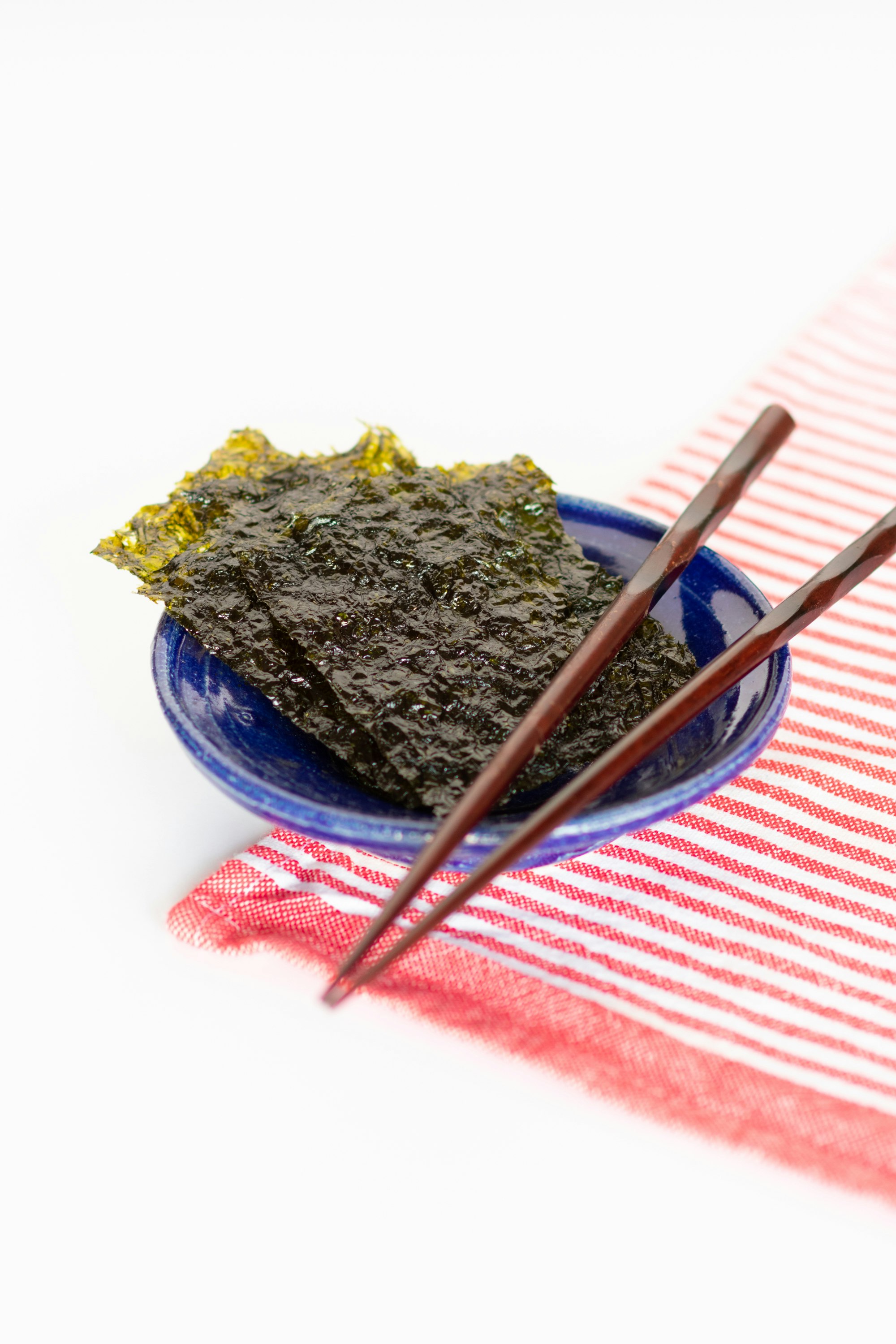When it comes to our furry friends' diet, we often find ourselves questioning the safety of various human foods. One such intriguing item is seaweed. Many have wondered, can dogs have seaweed? The short answer is yes, but as with all things, there's a bit more to the story.
The Nutritional Value of Seaweed for Dogs
Seaweed, in its many varieties, is packed with minerals, vitamins, and antioxidants. For humans, it’s a staple in many cultures, and the benefits are vast. But for dogs, it offers a unique set of advantages. Rich in Omega-3 fatty acids, seaweed can help reduce inflammation and is excellent for their coat. Moreover, it provides essential minerals like iodine, which supports thyroid function, especially vital for older dogs.

The Right Way to Introduce Seaweed
While seaweed is beneficial, it’s essential to introduce it in the right manner. Much like you wouldn't introduce a newfiedoodle to a brown-dobermans without proper precautions, the same goes for feeding seaweed to your canine companion. Always opt for dried seaweed products designed for dogs. Fresh seaweed from the beach might be contaminated or carry parasites harmful to pets. And remember, moderation is key.
Potential Risks and Considerations
No food discussion is complete without addressing potential risks. While seaweed offers numerous benefits, it's also high in salt. Excessive salt can be detrimental to dogs, leading to increased thirst, urination, and high sodium levels, which in severe cases, can be fatal.
If you've got a miniature collie or a corgi husky mix, you should be aware of their specific dietary needs. Some breeds may be more sensitive to changes in their diet.
Seaweed Supplements and Treats
Luckily, if you're not comfortable feeding natural seaweed to your dog, there are several seaweed supplements and treats available in the market. These products are specifically tailored for dogs, ensuring they receive all the benefits without the associated risks. It's a bit like ensuring a do cane corsos shed inquiry is met with proper grooming tools.
Observing Your Dog's Reaction
Always be keen to observe any changes in your dog's behavior or health. If your dog's shaking legs or showing any sign of discomfort after introducing a new food, it might be time to consult a vet.
Different Types of Seaweed for Dogs
There's a vast variety of seaweed, and not all of them might be suitable for your furry friend. A few types commonly used in dog supplements and foods include:
- Nori: This is the same seaweed that wraps around your sushi. Rich in protein, vitamin B12, and Omega-3s, it’s a beneficial snack when given in moderation.
- Kelp: Known for its high iodine content, kelp can be great for supporting thyroid health. But be cautious – an excess of kelp can lead to iodine overdose.
- Dulse: A red seaweed variant, dulse is rich in potassium, magnesium, and antioxidants.
- Spirulina: Technically a cyanobacteria rather than a seaweed, spirulina is nonetheless often grouped with them due to its aquatic nature and similar benefits. It's renowned for its detoxification abilities and can help with allergies.
Preparing Seaweed for Dogs
If you decide to introduce seaweed as a part of your dog’s diet, it's vital to ensure it's prepared correctly. Always ensure the seaweed is clean and free from any contaminants. Wash and rinse it thoroughly if you’re sourcing it fresh.
For dried variants, always rehydrate them before offering them to your dog. This makes them easier to digest and reduces the salt content. Remember to avoid adding any spices or flavorings. Your brown-dobermans might love the natural taste, but your corgi husky mix might need some time to adapt!
Benefits Beyond Nutrition
Apart from the evident nutritional benefits, regular, controlled consumption of seaweed can also lead to:
- Improved Digestion: Seaweed can boost your dog's digestion, thanks to its fiber content.
- Healthier Skin and Coat: The rich mineral and vitamin content in seaweed can make your dog's coat shinier and skin healthier. If you've ever wondered, "do cane corsos shed?" and wanted a solution to manage their shedding, introducing seaweed might be a good step.
- Enhanced Immune System: The antioxidants present in seaweed can help boost the immune system, making your dog more resilient against diseases.
Additional Tips on Seaweed for Dogs
Frequency of Feeding: While seaweed boasts a multitude of benefits, it should be given as a supplement and not as a primary food source. Consider it a treat or an occasional add-on to their meals. A couple of times a week, in controlled amounts, should suffice for most dogs.
Allergies and Sensitivities: Just as some dogs might be sensitive to certain grains or proteins, there’s a possibility that a dog might be allergic or sensitive to seaweed. Keep an eye out for signs like itching, hives, or digestive upset. For instance, if you notice a corgi husky mix scratching more than usual after having seaweed, it might be time to reconsider or consult a vet.
Storage: If you're buying dried seaweed, make sure to store it in a cool, dry place. Keeping it in airtight containers can also prevent it from drawing moisture, ensuring it stays fresh longer.
Source Responsibly: Not all seaweed products are created equal. It’s essential to ensure that the seaweed you’re purchasing, especially if it’s for consumption, is sourced from clean waters and is free from pollutants and heavy metals. Brands that are transparent about their sourcing and testing practices are typically more reliable.
A Note on Marine Sustainability
While seaweed can be a fantastic addition to your dog's diet, it's equally crucial to consider the environmental implications. With the growing popularity of seaweed, there are concerns about over-harvesting and the sustainability of seaweed farming.
Before purchasing, research the brand and their harvesting practices. Opt for products that are sustainably harvested or farmed. By doing so, you're not just ensuring a healthier treat for your pet but also contributing to marine conservation.

Bringing It All Together
Incorporating seaweed into your dog’s diet can be a holistic approach to their well-being. From that glossy shine in a brown lab's coat to easing digestive woes of a newfiedoodle, the benefits are clear. But, it's always about striking a balance.
Whether it's pondering questions like "do cane corsos shed?" or deciphering the right treat for a miniature collie, as pet parents, our journey is about continuous learning and adapting. Seaweed, with its impressive nutritional profile, is just another chapter in that journey.
So, the next time you find your dog intrigued by seaweed during your beach outings, you’ll have all the knowledge to make an informed decision. Here's to healthier, happier pups!
Seaweed vs. Sea Vegetables: Knowing the Difference
It's easy to lump all marine plants under the 'seaweed' category, but for the discerning pet parent, understanding the nuances can make all the difference. While all sea vegetables can be considered seaweed, not all seaweed is necessarily a sea vegetable. Sea vegetables are typically the edible varieties of seaweed. So, when shopping or considering what to feed your pup, always opt for the term 'sea vegetables' to ensure they're safe and nutritious.
DIY Seaweed Treats for Dogs
If you're someone who enjoys whipping up homemade treats for your pets, incorporating seaweed can be both fun and beneficial. Here’s a simple recipe:
Seaweed Dog Biscuits
Ingredients:
- 2 cups of whole wheat flour (or any alternative suitable for your dog)
- 1/2 cup of dried seaweed (nori or kelp), finely chopped or powdered
- 1 egg
- 3/4 cup of water (or as needed)
- A pinch of turmeric or ginger for added health benefits (optional)
Method:
- Preheat your oven to 350°F (175°C).
- In a bowl, mix the flour and seaweed powder.
- Beat in the egg, and gradually add water until the mixture forms a dough.
- Roll out the dough on a floured surface and cut into shapes – bones, paws, or even fish!
- Place them on a baking sheet and bake for 20-25 minutes or until crispy.
- Allow them to cool and store in an airtight container.
These biscuits are not just a treat but a health boost with the goodness of seaweed.
Seaweed for Other Pets?
While we've delved deep into dogs and seaweed, if you have other pets, you might wonder about them too. Cats, for instance, can also benefit from seaweed, particularly with thyroid function. Birds, especially parrots, might enjoy the occasional seaweed treat too. As always, moderation and research are paramount.

Seaweed and Tracking: The Role of FI Dog Collars
As we journey through the world of canine nutrition, like seaweed, it's equally essential to ensure our furry friends are safe and can be located easily. This is where modern technology, like the FI Dog Collar, comes into play.
Harnessing Modern Technology for Canine Safety
While we're on the subject of introducing beneficial elements like seaweed to our dog's diet, let's not forget the external factors that ensure their safety. The FI Dog Collar is more than just a regular collar. It combines the everyday necessity of a dog collar with state-of-the-art location tracking.
Sync Nutrition with Activity
Imagine you’ve introduced seaweed to boost your brown lab's energy. With an FI Dog Collar, you can track if there’s an uptick in their activity levels. This not only ensures they’re benefiting from the added nutrition but also gives you peace of mind knowing where they are at all times.
For those who own breeds with high energy levels, like the corgi husky mix or newfiedoodle, understanding how diet affects activity can be invaluable. If your miniature collie has been munching on seaweed treats, the FI Dog Collar’s tracking can show you if they're more active during their playtime.
Keeping an Eye on Your Adventurous Pup
Just as you'd be concerned about how a brown-dobermans reacts to seaweed, knowing where they're adventuring off to is crucial. The FI Dog Collar provides real-time tracking, ensuring that even if your dog decides to chase after a piece of seaweed blowing in the wind, you’ll be able to find them quickly.
Integrating Health and Safety
Health isn't just about what our pets consume but also about ensuring they're safe during their daily escapades. Incorporating seaweed into their diet for its myriad of benefits while equipping them with an FI Dog Collar for safety is an integrated approach to holistic pet care.
Conclusion:
In the realm of canine care, introducing nutritious seaweed into their diet can offer myriad health benefits, from enhancing digestion to boosting the immune system. Varieties like Nori, Kelp, and Spirulina stand out as top choices. However, with benefits come responsibilities: sourcing responsibly, watching for allergies, and balancing intake are essential.
Alongside nutrition, technology like the FI Dog Collar ensures their safety and tracks their activity, providing a holistic approach to dog care. Both seaweed and modern tracking tools symbolize the perfect blend of nutrition and safety, pivotal for the well-being of our beloved pets.
FAQs
1. Can all breeds of dogs consume seaweed?
While most dog breeds can benefit from the nutritional advantages of seaweed, individual dogs might have allergies or sensitivities. It's always a good practice to introduce any new food gradually and monitor for any adverse reactions.
2. How often should I feed my dog seaweed?
Seaweed should be given as a supplement, not as a primary food source. A couple of times a week in controlled amounts is generally recommended. However, always consult with a veterinarian for specific advice tailored to your dog.
3. Are there any potential risks associated with feeding seaweed to dogs?
While seaweed is generally safe, excessive consumption might lead to iodine overdose, especially from kelp. Also, sourcing is crucial. Seaweed from polluted waters can contain harmful contaminants.
4. How does the FI Dog Collar integrate with the topic of seaweed for dogs?
While seaweed focuses on internal health and nutrition, the FI Dog Collar emphasizes external safety and tracking. Both elements, nutrition and safety, are integral for holistic dog care. Monitoring activity levels with the FI Dog Collar can also help gauge the impact of dietary changes like introducing seaweed.
5. Can I prepare homemade seaweed treats for my dog?
Absolutely! Many pet owners prefer homemade treats to ensure the quality of ingredients. You can use dried seaweed, such as nori or kelp, and combine it with other dog-friendly ingredients to create nutritious biscuits or snacks. Just remember to introduce any new treat gradually.